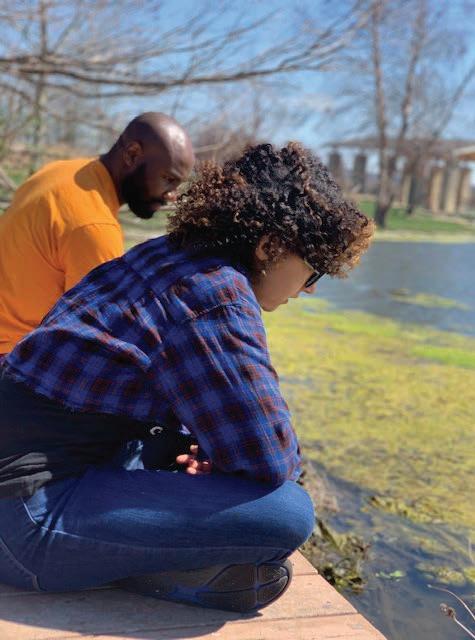
6 minute read
Summer Health Guide
Summer
Health Guide
from the Lawrence-Douglas County Health Department
Summer (especially this summer) is a great time to enjoy outdoor activities like family picnics, playing and swimming. However, as families spend more time active outside, you need to be mindful of the potential dangers that come along with hot, humid temperatures: mosquitoes, ticks and illnesses related to heat and swimming.
Here are some tips to have a safe and healthy summer...
Mosquitoes can cause bites that are not only itchy and annoying, but can potentially spread disease, like the Zika virus and West Nile virus. To protect your family from mosquito bites:
• Use insect repellent containing DEET and follow all directions and precautions on the label. Use just enough to cover exposed skin and/or on clothing. Parents should apply this product to their children, ages 2 months and older, avoiding hands, eyes and mouth. After returning indoors, wash treated skin with soap and water. Wash treated clothing before wearing again. Do not spray in enclosed areas.
• Insect repellents containing DEET should not be used on children under 2 months of age. Oil of lemon eucalyptus products should not be used on children under 3 years of age.
• Make sure doors and windows have tight-fitting screens. Repair or replace screens that have holes. Try to keep doors and windows shut, especially at night.
• Get rid of mosquito breeding sites by emptying standing water from flower pots, buckets and barrels. Change the water in outdoor pet dishes and replace the water in birdbaths weekly. Drill holes in tire swings so water drains out. Keep children’s wading pools empty and on their sides when they aren’t being used.
Ticks
Tick season peaks at the height of summer’s heat. In Kansas, ticks are prone to carry four diseases: Lyme disease, Rocky Mountain spotted fever, Ehrlichiosis and Tularemia.
Ticks lurk in tall grasses and bushy areas and then climb aboard humans as they walk by. Some ticks will attach quickly and others will wander looking for an area where the skin is thinner. They must be attached for more than 24 hours before they can transmit infection; therefore, finding and removing all ticks in a timely manner is critical to preventing disease. To help protect against ticks:
• Avoid wooded and bushy areas with tall grass and leaf litter.
• Keep grass cut and underbrush thinned in yards.
• Wear light-colored clothing so that ticks are easier to see and remove.
• Tuck pant legs into socks and boots. Wear long-sleeved shirts buttoned at the wrist. Tuck shirts into pants to keep ticks on the outside of clothing.
• When outdoors, use insect repellent containing DEET and follow all directions and precautions on the label.
• Bathe or shower as soon as possible after coming indoors, preferably within two hours, to wash off ticks and find them • Conduct tick checks on yourself, children and pets every four to six hours for several days after being in a tick-infested area. Ticks tend to attach in the following areas: under the arms, around the waist, behind the knees, between the legs, inside the belly button and in hair.
• Remove ticks as quickly as possible. The best method is to use tweezers and pull upward with steady, even pressure. After removing the tick, thoroughly clean the bite area and your hands with rubbing alcohol, an iodine scrub or soap and water.
• If you find a tick on your body, jot down the date it was discovered. If symptoms such as a rash, fever, headache, joint or muscle pains or swollen lymph nodes appear, contact your doctor as soon as possible. Tick-borne diseases can cause mild symptoms treatable at home with antibiotics to severe infections requiring hospitalization.
Heat
Heat-related illness happens when the body’s temperature control system is overloaded. Infants and children up to 4 years of age are at greatest risk. Even young and healthy people can get sick from the heat if they participate in strenuous physical activities during hot weather. To prevent heat-related illness:
• Never leave infants, children or pets in a parked car, even if the windows are cracked.
• Dress infants and children in loose, lightweight, light-colored clothing.
• Schedule outdoor activities for morning and evening hours.
• Take cool showers or baths.
Sun
Just a few serious sunburns can increase you and your child’s risk of skin cancer later in life. Their skin needs protection from the sun’s harmful ultraviolet (UV) rays whenever they’re outdoors. To prevent sunburns:
• Cover up. Clothing that covers you and your child’s skin helps protect against UV rays. Clothes made from tightly woven fabric offer the best protection.
• Wear a hat. Hats that shade the face, scalp, ears and neck are easy to use and give great protection.
• Use sunscreen with sun protection factor (SPF) of at least 30 and UVA and UVB protection every time your child goes outside. Be sure to follow application directions on the bottle or tube. It’s best to apply sunscreen generously 30 minutes before going outdoors.
• Limit exposure. UV rays are most intense between 10 a.m. and 4 p.m.
Water related illnesses
Recreational water illnesses are caused by germs spread by swallowing or having contact with contaminated water in swimming pools, hot tubs and spas, interactive fountains, lakes or rivers.
Contrary to popular belief, chlorine and other disinfectants do not kill germs instantly. While most germs are killed within minutes, Cryptosporidium can live for days. Before they are killed, these germs can cause illnesses, such as gastrointestinal, skin, ear, respiratory, eye, neurologic and wound infections. The most commonly reported recreational water illness is diarrhea caused by germs such as Cryptosporidium, Giardia, Shigella, Norovirus and E. coli. Swallowing just a mouthful of water that contains these germs can make you sick. Here are a few simple and effective steps all swimmers can take:
• Stay out of the water if you have diarrhea.
• Shower before you get in the water.
• Don’t swallow the water you swim in. • Wash your hands after using the toilet or changing diapers.
Drowning
Every day, 10 people die from drowning, and of those, two are children ages 14 and younger. Of drowning victims who survive and are treated in emergency rooms, more than half are hospitalized or transferred for further care. These individuals often experience brain damage, which can cause memory problems, learning disabilities or permanent loss of basic functioning. To prevent drowning:
• Designate an adult to watch children swimming or playing around water. Adults should not be involved in any other distracting activity.
• Use life jackets appropriately. Don’t use air-filled or foam toys, such as noodles or inner tubes, instead of life jackets because they are not designed to keep swimmers safe.
• Avoid alcohol when swimming, boating or supervising children.
• Know the local weather conditions and forecast before swimming or boating. LK

Now Enrolling for 2020-2021! Infants - Six Years
Full-day schedule / Year-round school Individualized education for children Birth to age six Beautiful spacious classrooms and playscape
Call for a tour today!


Nurturing the intellect and spirit of children
Adrianne Morales-Jackson



Leaa Glendening





